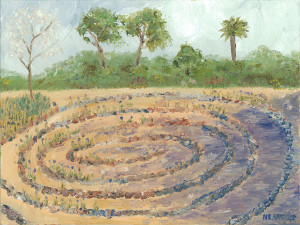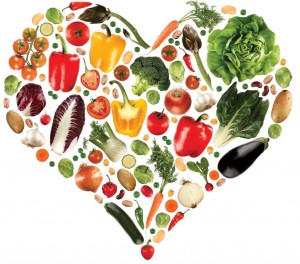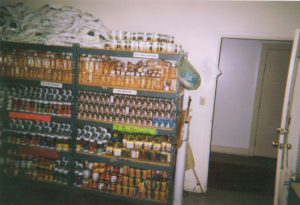Hunger: An Introduction
The first time I ever saw a child begging for food was in Mexico. I was on a car trip going through Monterrey on the way to visit my future in-laws in Mexico City. When we parked the car in front of a restaurant, children immediately surrounded the vehicle. Small children held their hands out, asking for money for food. Each held up little brown palms. Their pleading faces looked into my eyes.
At that time, I didn’t yet speak any Spanish, but I didn’t need a vocabulary beyond English to understand the situation. Their body language spoke of expectations, hope and hunger.
“Don’t worry yourself about this Coit. They’re just after a few pesos.” My soon-to-be husband tried to comfort me. In my heart I knew different. The child we discussed was about the size of a thin eight-year-old. Teeth don’t lie though. He had a mouth full of adult teeth. That put his age at about twelve years.
In Mexico, children dig through trash for food. And, nine years after this road trip, in Mexico City, a beautiful young Indian woman standing on a corner tried to sell her infant. She approached my church friends first, an American couple in Mexico City on a study visa. Bob and Sue felt they couldn’t get the baby over the border when they returned to the U.S. at the end of their class. I wasn’t a good candidate because, at the time we discussed the baby, I was still married, had no visa or citizenship papers, and didn’t feel I was ever going to cross back over the river heading North.
Whatever happened to that beautiful baby? Whatever happened to her desperate mother? I’ll never know.
You want to talk hunger, then let’s discuss Venezuela and Mexico for a while. Even now, years later, I remember each encounter with a hungry person or household as if it happened only yesterday. I’ll never forget those people, the look of hunger in their eyes.
When people wanted to talk to me about hunger in America, it was a nonissue. Hunger in America? Whoever heard of such a thing?
Hunger has been with us in this country since the beginning. Famous American history stories include Pilgrims starving over the first winter in their new home. The stories of Mormons starving when they headed west are just two. These stories are different from segments of our population going to bed hungry because there isn’t enough money for food.
Even though I’m the loudest mouth in the crowd when I talk about hungry people in America, I’ve never seen hungry children begging for food when I park my car outside a store or restaurant.
Somehow, in this country, hungry people keep themselves hidden unless they are in the food pantry or soup kitchen line.
I lived in both of those places. I could talk hunger with you “until the cows come home,” as my grandmother said. But America? “Fuggedaboutit,” as I heard someone say once on a Brooklyn bus tour.
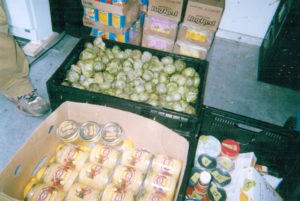
Thank you for reading this blog post. It is an excerpt from “The Ketchup Sandwich Chronicles”. I’ll be posting more stories from this book in the coming days.
I hope you enjoy them. If so, please refer the posts to your favorite social media network.
But, whether you refer them or not, I thank you for reading this story.
Thurman Greco


It’s Vacation Time!
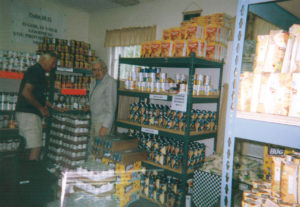
Your vacation time is here! It’s your last chance to get a break this summer. That means it’s time to go to the beach – to the mountains – to the city – ANYWHERE!
What do you have to do to get away? Well, first, find a place to go. Second, pack your bags.
FINALLY, drop off loads of food to your neighborhood food pantry before you take off on your vacation..
August is the most challenging month of the year for food pantries because it’s the month with the least amount of food available at the food bank. Food pantries get most of their food from donations and very few people donate in August. And, sadly, this carries right through to September. September brings school openings with parents getting ready for school lunches. Food pantries are often empty.
It’s my opinion that people don’t donate food to food pantries in August because they’re focused on their own activities: vacation, getting kids ready for school.
But, your neighborhood food pantry doesn’t have to be empty. There are things you can do. You can organize a food drive in your neighborhood and take the food to the food pantry. You can keep the food flowing right through to October.
Thank you in advance for thinking of things you can do for your food pantry during the leanest months of the year.
Please refer this article to your preferred social media network.
Thurman Greco

Are You Working On or Off?

A fairly common question I heard in the pantry line: “Are you working on or off?”
The first time I heard this question, I was confused. What did it mean? Actually, it referred to whether or not the person was paid in cash under the table or was paid money with withholding taken out.
Often the answer was something like: “I’ve got two days over at the food store and three days at Mrs. O……’s where I help her with her house and her office. I’m looking for a few more hours but it’s not happening.”
What this question asked was how many hours a person worked on the books and how many hours off the books. Not only was this practice illegal but it robbed workers of any benefit accrual and the opportunity to pay taxes.
Minimum wage paychecks simply don’t last a week. Individuals, families, entire households even can be employed and still live in poverty. My experience in the pantry was that more people in the pantry shopping line are employed than not.
I used to think of people as being employed or unemployed.
As I gained experience with the situation, I added another label: underemployed. So, rather than thinking in terms of employed or unemployed, I thought of hungry people in the line as being employed or underemployed.
I still see unemployed people but I realized many people aren’t paid a living wage.
I see shoppers where each person in the household works more than one job. The hope, dream, goal for many is simply to work enough hours and make enough money that a person can take a day off occasionally and have enough money to eat the following day.
People holding down more than one job often had trouble finding time to get to the Department of Social Services office to apply for SNAP (food stamps), although they might have qualified for the benefits.
Without a secure community safety net for the poor and destitute in our country, pantry volunteers needed to feed groceries weekly to families and households without money after they paid for rent and transportation to get to work.
Since the ’90s, many states have been “hell bent to Harry” to get people to work…no matter what. Welfare is no longer on the table.
A tip: Some people don’t realize our nation hasn’t offered much in the way of welfare in a long, long time. In polite conversation, I heard a statement: “That person shouldn’t be in your line. Her son has a job and she has a car.” I find it amazing that people in this country have been and continue to be comfortable denying assistance to the needy and destitute families while offering tax breaks to the wealthy.
My question was this: “How do people cope?”
Work first is not always a good option. I regularly saw pantry shoppers with family members who would be institutionalized if they weren’t being cared for by family. The institution is always the more expensive option.
The problem was that the family had nothing. So, while Helen or Sue or Fred was caring for the ill/disabled person, s/he wasn’t able to work.
Employment opportunities are a large part of the problem. People find themselves down and out in places with few job opportunities. Young people graduated from high school or college and can’t find a job anywhere.
Every economic downturn erases job opportunities. When the economy finally recovers, many jobs don’t return. Each recovery creates a class of citizens permanently living in the poverty of unemployment, underemployment, temporary employment, and day labor. Part time employment and being “on call” is a way of life.
The new group created after the downturn of 2008 had its own label: The Struggling Class.
Education costs are a factor. Fewer and fewer people can afford college or trade school. Some are afraid of the college loans they might not be able to pay off. One young woman in our food pantry line worked sixty hours weekly in low wage jobs to repay her college loan.
A fundamental attitude adjustment helped us realize food stamps, food pantries, soup kitchens, and shelters are no longer emergency concepts. They are the new way of life in the 21st century.
BEN
“I’m finished!” he blurted out. ” They fired me today!” I’ll never be able to get another job again. I’m too old!” Frightened reality covered his face when he entered the pantry for the first time. I didn’t say a word. I let him shout. He didn’t look or act as if he was going to hurt anyone and I felt he needed to release his anger.
I wanted his life to be easier than it was but what I wanted for him or any other shopper was nothing more than wishful thinking. There was little to nothing I could do. And, truthfully, I was helpless to do anything for him beyond offering a three-day-supply of food.
Every week after the first visit, he entered the pantry, shopped, and never made a sound. The mask of his face never changed.
Once the hair goes grey, it’s hard to compete in the market place. In a down economy, employers hire the younger applicants believing they’ll work harder for less money.
I hoped his unemployment would hold out until he could figure out how to get something more.
We all just left him alone. The pantry space was so small. It took him a year to calm down.
All we had was delicious, nutritious, food with a heavy emphasis on fresh vegetables and fruits. I relied on the food to make up for what we didn’t have.
I saw him recently – calm, maybe at peace with his situation. He lives in his truck, semi-homeless I suppose. He has places to bathe and sleep when he’s in Woodstock.
Woodstock attracts musicians. He’s one of those considered talented, this man. He’s found places to play around the area and he’s looking okay. What more can we all ask for anyway?
Thurman Greco
Thank you for reading this blog post. Please refer it to your favorite social media network.
Thurman
A new book is coming soon! Please be on the lookout for Miracles!
Thanks again!
10 Things You Can Do For Hungry People Now
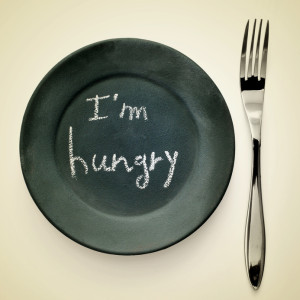
DONATE FOOD TO A FOOD PANTRY
When you purchase groceries, buy a few extra jars or cans of food and take them to your neighborhood food pantry.
Peanut butter is my favorite choice. It’s shelf stable so needs no refrigeration. That makes it good for homeless people. It doesn’t spoil quickly so it can be used by a household with one or ten people. It doesn’t require a lot of chewing so it’s good for a person with no teeth. In short, peanut butter is a perfect food choice for a food pantry.
However, if you would rather choose another item, go with whatever you want to give. Whatever you choose, it will be selected by someone shopping in the pantry.
CLEAN OUT YOUR KITCHEN CABINETS
Give the unused items to your local food pantry.
HOST A FOOD DRIVE
Invite your friends and neighbors to help you collect food for your local food pantry.
DONATE CLEAN EGG CARTONS AND REUSABLE SHOPPING BAGS TO YOUR FOOD PANTRY.
Food pantries are always in need of shopping bags and egg cartons. Eggs coming to a food pantry usually come in cases – without the cartons.
Shopping bags are not usually found on food pantry shopping lists.
CLEAN OUT THAT CLOSET!
Take your gently used clothing and bedding to a pantry or soup kitchen for distribution. I recently learned that the clothing item most needed in shelters is socks.
I also learned that women’s shelters are always in need of bras.
In the Albany, New York, area, you can send gently used or new women’s bras to:
YWCA – Greater Capitol Region
Brava
21 First Street
Troy, New York 12180
CELEBRATE YOUR BIRTHDAY.
Invite people to a party and ask them to give donations to a food pantry instead of a gift.
GIVE A LITTLE THROUGHOUT THE YEAR.
Make a regular donation to a food pantry. This translates to sending a check or gas card every month or quarter.
CONTACT ELECTED OFFICIALS AND PERSONS OF INFLUENCE.
Motivate them to make ending hunger and homelessness a priority. Encourage them to support fair wages and benefits for workers.
READ A BOOK.
“Take This Bread” by Sara Miles, “Under the Overpass” by Mike Yankoski, “I am Your Neighbor” by David R. Brown and Roger Wright, and “I Don’t Hang Out in Churches Anymore” by Thurman Greco are four books which tell revealing stories about hungry people in America.
START A SCHOOL BACKPACK PROGRAM.
Backpack programs send food home on Friday afternoons to households where children would not otherwise eat over the weekend without the donated foods.
Thanks for reading this article! Please refer it to your preferred social media network.
Thurman Greco
Woodstock

.
This was almost the last weekend.

There’s only one more weekend left at Mower’s Meadow Flea Market this year. I’ll be there the Saturday and Sunday after Thanksgiving and then that’ll be it for awhile. I understand the flea market doesn’t open weekends again until May.
Don’t quote me on that. I’m not sure. But, one thing I’m sure about: I plan to be there every weekend next season. The hunger book, the donation jar, and I plan to be at Mower’s Meadow Flea Market next season.
I was at a different spot at the flea market every weekend. And, I really enjoyed being there. The people at the other booths were friendly, open, and interested in my booth. I got many tips and tried them all. It was obvious to everyone that I really didn’t know much about flea market marketing. I still don’t know much but my booth presentation has definitely improved.
Thank you to each and every one who bought copies of “I Don’t Hang Out in Churches Anymore”. I doubt if “The Ketchup Sandwich Chronicles” will be available by then but I working on it every day.
The title “I Don’t Hang Out in Churches Anymore” was named by Cullen Thomas and it was well chosen. Many people who picked up the book on the table were bothered by the title because they didn’t understand it. However, it definitely attracted attention.
For those with questions, the title referred to an “unhoused” congregation serving people outside the sanctuary. And, the food pantry was definitely outside the boundary of the sanctuary. The food pantry was, in fact, in the basement.
This story isn’t about how to fix or save or change a church. Nor is it, really, a story about a church at all. In fact, it’s not a manual about anything. It’s a story about how I discovered hungry people in the basement of the building in a tiny food pantry in the corner room.
A memoir, this story tells the truth as I remember it.
If you haven’t had a chance to read this book, it’ll be available at thurmangreco.com during the winter unless I find an indoor weekend flea market that’s appropriate for a table of books and open on the weekend.
My goal is to offer Reiki therapy and tarot readings in addition to the books at the flea market in the future.
But, whether I offer Reiki and tarot or not, I plan to be at a table selling both “I Don’t Hang Out in Churches Anymore” and “Healer’s Handbook”. When “Ketchup Sandwich Chronicles” comes out, I’ll add it to the stack!
See you there!
Thurman Greco
Please refer this article to your preferred social media network.

Summer Came and Went. And a book signing…
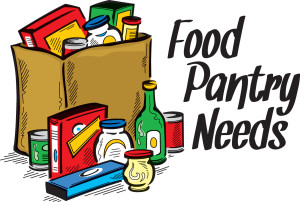
Please join me.
You are invited to attend my Author’s Reading and book signing on Saturday morning, September 22nd at 10:00 am on the grounds of the Mower’s Meadow Flea Market.
Refreshments will be served.
School is starting. And, once again, the focus of my life has adjusted itself. Hunger takes us all to new places that we never thought we would go.
For me, I spent the past two years writing my hunger book. I felt as if I’d gone into a cave…a writer’s cave. And, of course, with all this time in the cave, the inevitable finally happened: a book signing.
I finished the book! Not only that, I’m working on the follow-on volume. But, that’s getting off message.
A book signing is always appropriate in September.
Where? I’m selling the book at the Mower’s Meadow Flea Market in Woodstock. Somehow, I feel this was the logical direction I was headed from the first day: a book signing.
I sell the book….and a lot more. While selling the book, people purchase other used books and gently used items to raise money for the hungry.
I’m selling items and collecting donations to buy peanut butter for a pantry which doesn’t have any on the shelves on the day I call the pantry. Why peanut butter?
Peanut butter doesn’t need refrigeration.
It can be eaten by people who no longer have teeth.
Peanut butter has a generous shelf life.
For homeless people, peanut butter is a staple.
But, getting back to the basics, people are dropping gently used items off at my home. I wash them, or dust them off, and otherwise freshen them up and then take them to Mower’s Meadow on Saturdays, Sundays, and Wednesdays.
The prices are reasonable. The items are really nice. People fighting hunger are being really generous.
Lucy and Erin made a wonderful banner for my booth so people know what’s happening in the booth.
 Thank you for reading this blog post. Please refer it to your preferred social media network.
Thank you for reading this blog post. Please refer it to your preferred social media network.
I look forward to seeing you at the Book Signing at 10:00 on the 22nd!
Thurman Greco
9 Things You Can Do to Cut Out the Unhealthy Salt in Your Life So You Can Be Healthier
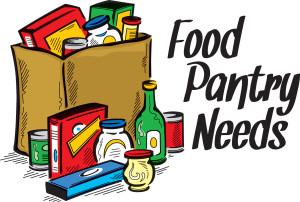
If being involved in a pantry does nothing else, it teaches us to be aware of the impact that salt has on our health. Getting too much salt, and getting the wrong salt, are two important things we need to learn about in order to be healthier.
An important ingredient in fast food is salt. Many canned soups we eat at home have unrealistically high amounts of salt. Salt is everywhere!
1. ADD CELERY TO YOUR MEALS WHENEVER YOU CAN. Sprinkle chopped celery on salads, soup, cooked vegetables, cooked meats. Be generous. Celery offers a crunch, and has potassium, something we all need. If you can get enough celery at the pantry, stuff it with peanut butter for a healthy meal or snack. If you suffer with hypertension, eat generous amounts of celery every day.
2. WHEN YOU MAKE SALADS WITH ONIONS, AND RADISHES, YOU WON’T MISS THE SALT AT ALL.
3. BE GENEROUS WITH PEPPER AND HERBS.
4. GO FOR EDIBLE FLOWERS. Experiment with herbs and flowrs on your salads: chives, dandelions, garlic, mint, nasturtiums, onions, violets.
5. CHOPPED FRESH GREEN BEANS ARE GOOD TASTE TREATS ON SOUPS, SALADS, VEGETABLES.
6. LOW SODIUM CANNED BEANS SUCH AS PINTOS, CHICKPEAS, BLACK, KIDNEY MAKE GOOD ADDITIONS TO SALADS, SOUPS, VEGETABLES.
7. MAKE YOUR OWN CROUTONS. Your homemade variety will be just as tasty if you rub the bread with garlic before preparation and then sprinkle them with herbs.
8. MAKE YOUR OWN SOUP. The best soups come without a label. What you prepare at home can have less fat, salt, sugar, MSG and preservatives. Substitute herbs.
9. SALAD DRESSING YOU MAKE AT HOME CAN BE MORE FLAVORFUL IF YOU CAN USE UNREFINED OILS. That way, you’ll get healthy fats, vitamins, and distinctive flavors.
Thank you for reading this blog.
Please share this article with your preferred social media network.
There will be more posts in the future about healthy eating and at least one will feature Real Salt, which I recommend. Hope you find them both fun and interesting.
Peace and food for all.
Thurman Greco

